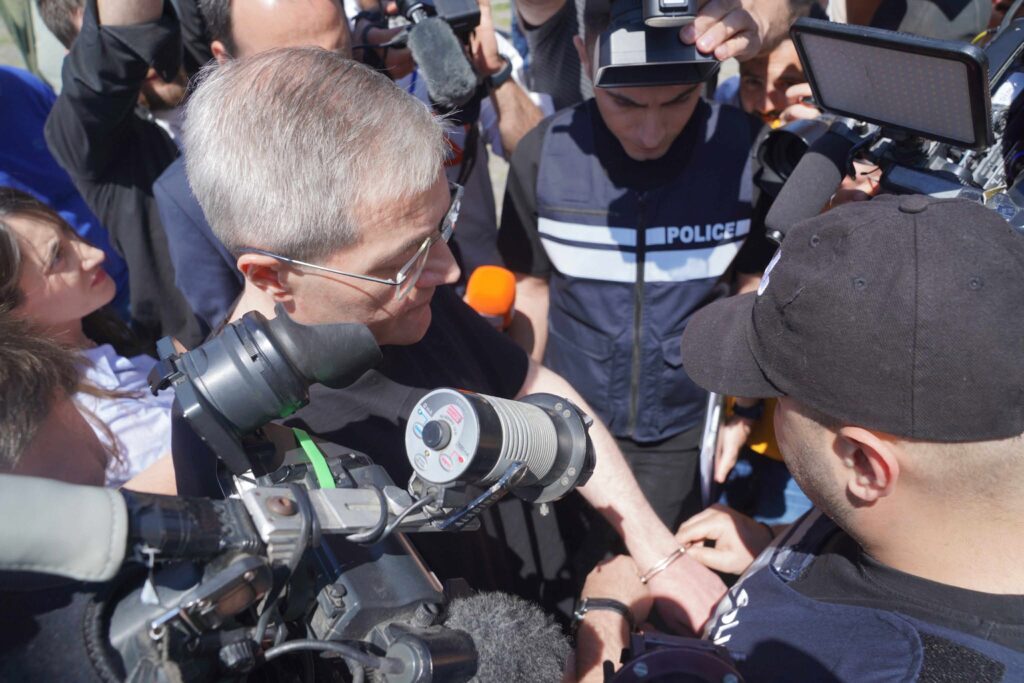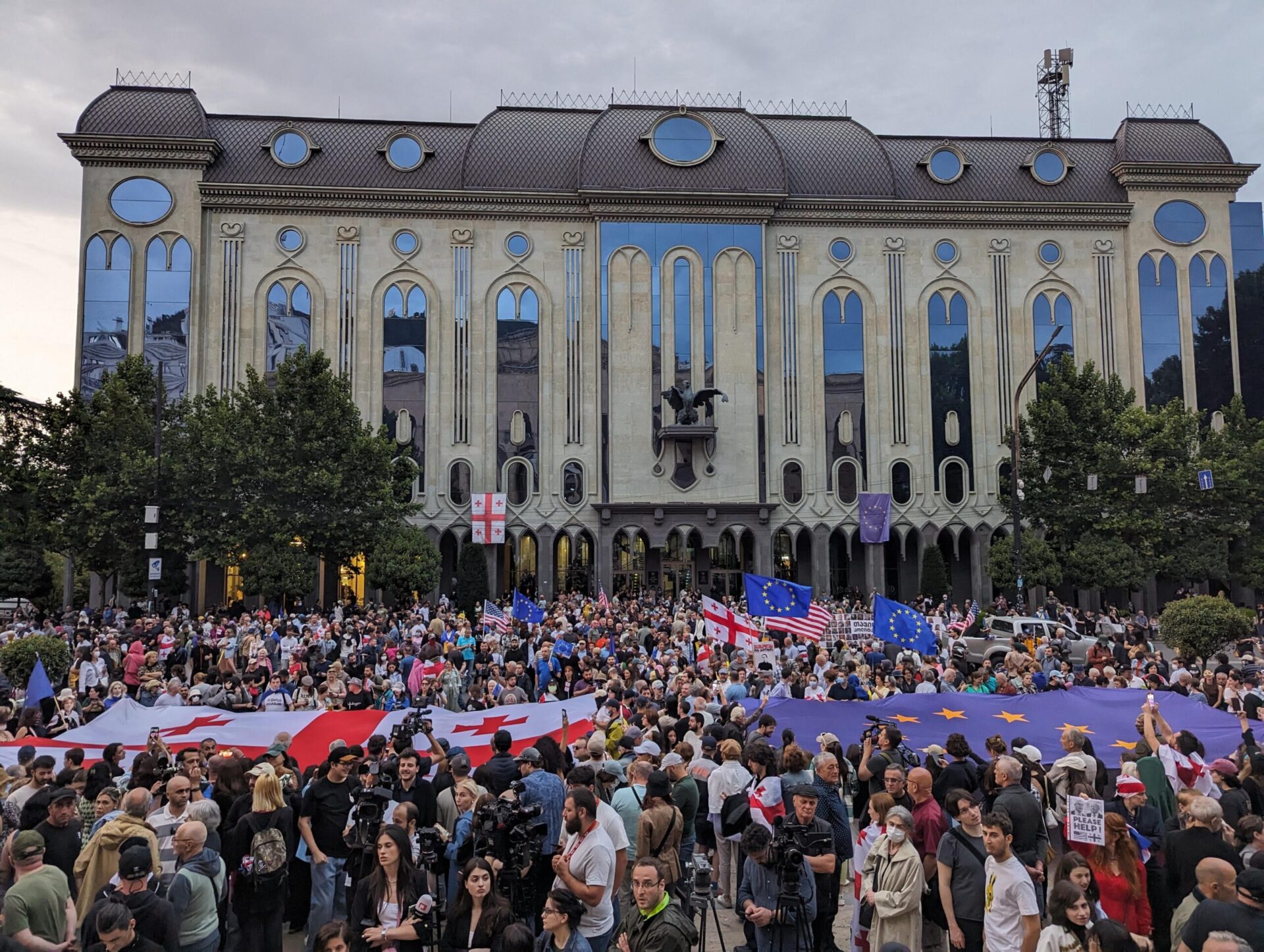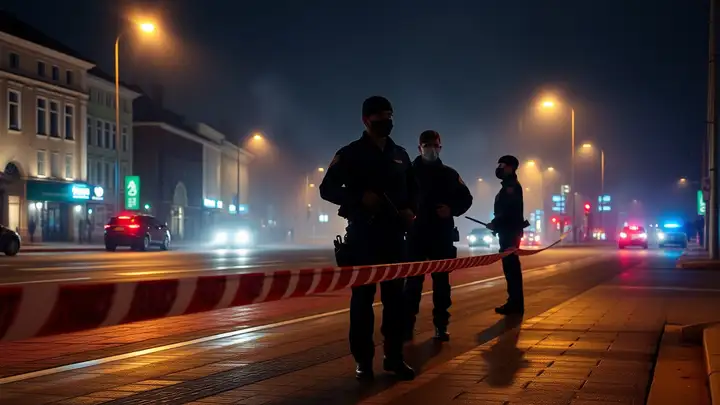
Georgian Opposition Unites Behind Single Presidential Candidate
Georgian Opposition Unites Behind Single Presidential Candidate
The leaders of ten Georgian opposition parties affiliated with the coalition “Power Is in Unity” gathered near the Bagrat Temple, in the city of Kutaisi, on July 18, to name their joint candidate for president (Georgia Today, July 18). Presidential elections in this South Caucasus republic will be held in October. Incumbent President Giorgi Margvelashvili, who has yet to announce if he will officially run again (Vestnik Kavkaza, July 19; Ekho Kavkaza, July 23), has still not set an exact date for election day.
The Power Is in Unity coalition decided to beat all other political forces of the country to the punch by coming out first to name its nominee: former foreign minister (2008–2012) Grigol Vashadze (Georgia Today, July 18).
Of the ten member parties within the political alliance, the most influential is undoubtedly the United National Movement (UNM) of former president Mikhail Saakashvili. So perhaps unsurprisingly, its representative became the coalition’s joint candidate. Vashadze is a member of UNM’s political council and is considered one of the most prominent leaders of “Saakashvili’s Party.” Furthermore, he is a close friend of the third president of Georgia, who resides abroad.
In his remarks after accepting the nomination, Vashadze stated that this year’s presidential elections will be held under difficult international conditions, as Russia “continues with its multi-vector military-terrorist aggression and the occupation of the territories of Georgia, Ukraine and Moldova.” In addition, Russia “interferes in democratic elections around the world” (Kommersant, July 17).
In order to respond to these challenges, Georgia, according to the candidate, “should be freed from the feudal government of the oligarch who privatized Georgia and conducts experiments on it.” Vashadze had in mind the chair of the ruling Georgian Dream (GD) party, billionaire Bidzina Ivanishvili. Vashadze promised to tackle corruption and start peaceful negotiations with the Abkhazians and Ossetians who live in the Georgian territories occupied by Russia (Kommersant, July 17).
In a video address to the nation, Mikhail Saakashvili said, “The candidate from the Power Is in Unity alliance will become the next president of the country […] and after his victory, the opposition will force the authorities to schedule early parliamentary elections” (Kommersant, July 17).
According to the new constitution, adopted last year, Georgia is a parliamentary republic (Georgia Today, September 27, 2017). Therefore, some have downplayed the importance of the upcoming presidential election: the real power rests with the prime minister, not the president. But as the former chairman of the constitutional court, Avtandil Demetrashvili, explained to this author in November 2017, “The president still has important powers, including the rights to pardon a convicted individual and to grant Georgian citizenship to a foreigner” (Author’s interview, November 18, 2017).
A Tbilisi court sentenced the former president, Mikheil Saakashvili, in absentia, to six years of imprisonment for exceeding his official powers and for his alleged role in the case of a high-profile violent attack against opposition lawmaker Valeri Gelashvili (Panorama, June 28). In addition, Saakashvili was deprived of Georgian citizenship by a decree issue by President Margvelashvili, after having received Ukrainian citizenship. Ultimately, following his falling out with Ukraine’s President Petro Poroshenko, Saakashvili also lost his Ukrainian citizenship (see EDM, September 14, 2017). He is currently a stateless person and lives in the Netherlands under a special document, which he was issued as the husband of a Dutch national—former first lady Sandra Roelofs.
“If Grigol Vashadze becomes president, he will pardon Mikheil Saakashvili and reinstate his citizenship,” thus allowing the latter to step back into Georgian politics, Georgia’s Republican Party founder, Levan Berdzenishvili, asserted. However, Berdzenishvili is convinced this is an unrealistic scenario: “Vashadze cannot win. Ivanishvili’s candidate from Georgian Dream will become president. GD has not yet named its candidate, but Georgian society has been primed to vote for anyone nominated by the billionaire Ivanishvili” (Author’s interview, June 15).
Political scientist Iosif Tsiscarishvili largely agrees with this pessimistic view, noting that Vashadze is widely perceived as a “representative of Saakashvili.” “The former president is already disastrously unpopular,” and the election of Vashadze would be “a leap into the past,” Tsiscarishvili said (Author’s interview, June 15).
Yet, some other experts have pointed out Vashadze’s high level of professionalism. “He was the best minister of foreign affairs, a very artful polemist and will be able to conduct a good election campaign. It will be difficult for any Georgian Dream candidate to debate him,” noted Professor Tornike Sharashenidze, of the Georgian Institute of Public Affairs. Nonetheless, he predicts the presidential race will be quite dirty: “Vashadze will be reminded that he worked in the Ministry of Foreign Affairs of the Soviet Union and then in the Ministry of Foreign Affairs of Russia,” the expert stressed (Author’s interview, June 15).
Vashadze is 60 years old. In the 1980s, he held high positions in the Soviet foreign ministry, including as an employee of the Department of Atomic Weapons and Space. He returned to Georgia after the “Rose Revolution,” in 2003. During the 2008 Russian invasion of Georgia, Vashadze served as deputy foreign minister in Tbilisi. And he took over the ministry after the war. In January 2009, Vashadze and then–US Secretary of State Condoleezza Rice signed the “Charter on Strategic Partnership,” described by Georgian officials as “historic” (Civil Georgia, January 9, 2009).
The ultimate success of Vashadze’s presidential campaign will depend on several factors, including whether there will be a second round of elections. With the help of intermediation by the European People’s Party, UNM and the country’s second-most influential opposition party, European Georgia (EG), reached an agreement not to criticize each other during the presidential campaign. And both pledged to support the opposition candidate in the second round.
EG has not yet named its own candidate, but according to unofficial information, they will nominate former parliamentary speaker David Bakradze. Georgi Nodia, a professor at Ilia State University, emphasized the importance of the UNM-EG agreement, “which increases the possibility [of winning] for the opposition.” In his opinion, the candidate from GD will be a favorite to win the presidential race, but the opposition may have a chance in the second round (Author’s interview, June 15, 2018).
The ruling party plans to name its candidate in the near future. During his recent visit to Brussels, Prime Minister Mamuka Bakhtadze promised the European Union leadership that his government will hold fair and transparent elections, which will highlight Georgia’s loyalty to its obligations under the Association Agreement with the EU (Europa.eu, July 19). Brussels will surely be watching.


